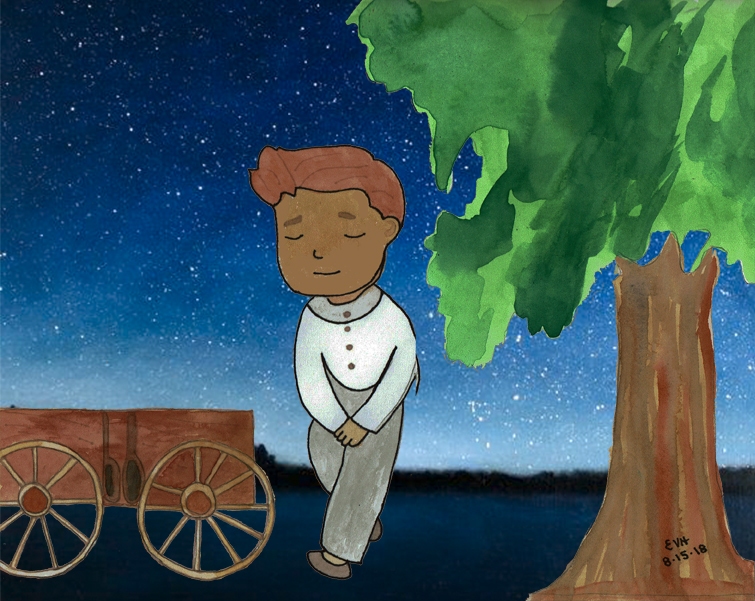
Jataka 76
Asaṃkiya Jātaka
The Guardian
as told by Eric Van Horn
originally translated by Robert Chalmers, B.A., of Oriel College, Oxford University
originally edited by Professor Edward Byles Cowell, Cambridge University
Buddhism is sometimes criticized as being self-centered because of the emphasis on personal liberation. But in this story, we see one of the Buddha’s fundamental teachings, and that is that by developing our own minds, we also protect those around us. We underestimate the amount of harm we do because of our untrained and undisciplined minds, and we do not appreciate the amount of good that comes from a mind that is free from greed, hatred, and ignorance.
We also see another lesson of the Buddha’s, and that is that when we have little, we have little to fear and we suffer less. Sharon Salzberg tells the story about being in a wealthy person’s home when a very expensive vase broke. They were distraught about the loss. But as the saying goes, when you have nothing, you have nothing to lose, and with that can come incredible freedom. This is the freedom of a life of simplicity and a mind that does not crave.
“The village breeds no fear in me.” This story was told by the Master while at Jetavana. It is about a lay brother who lived at Sāvatthi. Tradition says that this man, who had entered the path and was an earnest believer, was once traveling on business in the company of the leader of a caravan. They were in the jungle when the carts were unyoked and a camp was constructed, and the good man began to pace up and down at the foot of a tree near the leader.
Now 500 robbers, who had bided their time, had surrounded the spot armed with bows, clubs, and other weapons. They were intent on looting the encampment. But unceasingly that lay brother paced back and forth. “That must be their sentry,” the robbers said when they saw him. “We will wait until he is asleep, and then we will rob them.”
But because that lay brother kept pacing back and forth all through the first watch, all through the middle watch, and all through the last watch of the night, they were unable to surprise the camp. When day dawned, the robbers, who had never had their chance, threw down the stones and clubs and ran away.
His business done, that lay brother came back to Sāvatthi, and approaching the Master, asked him this question, “In guarding themselves, sir, do men also guard others?”
“Yes, lay brother. In guarding himself a man guards others. In guarding others, he guards himself.”
“Oh, how well said, sir, is this utterance of the Blessed One! When I was traveling with a caravan leader, I resolved to guard myself by pacing back and forth at the foot of a tree, and by so doing I guarded the whole caravan.”
The Master said, “Lay brother, in bygone days too the wise and good guarded others while guarding themselves.” And, so saying, at the lay brother’s request he told this story of the past.
Once upon a time when Brahmadatta was reigning in Benares, the Bodhisatta was born as a brahmin. When he came of age, he became aware of the evil that comes from lust, and so he forsook the world to live as a recluse in the country round the Himalayas.
Needing salt and vinegar, he went on a pilgrimage for alms through the countryside. In the course of his wanderings, he came to travel with a merchant’s caravan. When the caravan halted at a certain spot in the forest, he paced back and forth at the foot of a tree, near the caravan, enjoying the bliss of Insight.
Now after supper 500 robbers surrounded the camp to plunder it. But seeing the ascetic, they halted, saying, “If he sees us, he’ll give the alarm. Wait until he drops off to sleep, and then we'll plunder them.” But all through the night the ascetic continued to pace back and forth, and the robbers never got their chance. So they threw away their sticks and stones and shouted to the people in the caravan, “Hi, there! You of the caravan! If it hadn't been for that ascetic walking about under the tree, we'd have plundered the lot of you. Mind and honor him tomorrow!” And so saying, they left.

Figure: In Guarding Yourself, You Also Guard Others
When the night gave way to day, the people saw the clubs and stones that the robbers had cast away. They came in fear and trembling to ask the Bodhisatta with respectful salutation whether he had seen the robbers.
“Oh, yes, I did, sirs,” he replied.
“And were you not alarmed or afraid at the sight of so many robbers?”
“No,” said the Bodhisatta. “The sight of robbers causes fear only to the rich. As for me, I am penniless. Why should I be afraid? Whether I live in a village or in a forest, I never have any fear or dread.” And then, to teach them the Dharma, he repeated this stanza:
The village breeds no fear in me,
No forests dismay me.
I’ve won by love and charity
Liberation’s perfect way.
When the Bodhisatta had taught the Dharma in this stanza to the people of the caravan, peace filled their hearts, and they showed him honor and veneration. All his life long he developed the Four Excellences (1. Impermanence, 2. Dukkha, 3. Non-self, and 4. Nirvana), and then he was reborn into the Brahma Realm.
His lesson ended, the Master showed the connection and identified the birth by saying, “The Buddha’s followers were the members of the caravan of those days, and I was the ascetic.”
